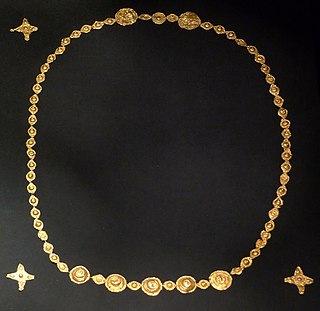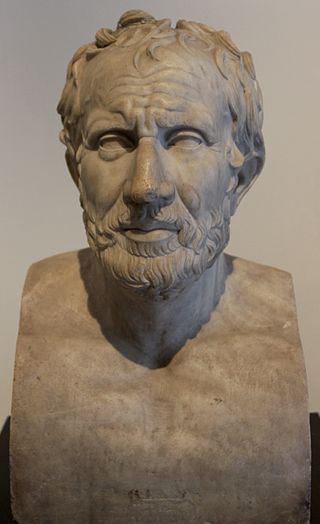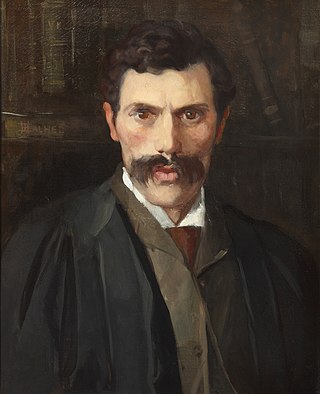Related Research Articles

Herodotus was a Greek historian and geographer from the Greek city of Halicarnassus, part of the Persian Empire and a later citizen of Thurii in modern Calabria (Italy). He is known for having written the Histories – a detailed account of the Greco-Persian Wars. Herodotus was the first writer to perform systematic investigation of historical events. He is referred to as "The Father of History", a title conferred on him by the ancient Roman orator Cicero.

The Vandals were a Germanic people who first inhabited what is now southern Poland. They established Vandal kingdoms on the Iberian Peninsula, Mediterranean islands, and North Africa in the fifth century.

The Realencyclopädie der classischen Altertumswissenschaft, commonly called the Pauly–Wissowa or simply RE, or PW, is a German encyclopedia of classical scholarship. With its supplements, it comprises over eighty volumes.

Lucius Cassius Dio, also known as Dio Cassius, was a Roman historian and senator of maternal Greek origin. He published 80 volumes of the history of ancient Rome, beginning with the arrival of Aeneas in Italy. The volumes documented the subsequent founding of Rome, the formation of the Republic, and the creation of the Empire up until 229 AD, during the reign of Severus Alexander. Written in Ancient Greek over 22 years, Dio's work covers approximately 1,000 years of history. Many of his 80 books have survived intact, or as fragments, providing modern scholars with a detailed perspective on Roman history.
The Oxford Classical Dictionary (OCD) is generally considered "the best one-volume dictionary on antiquity," an encyclopædic work in English consisting of articles relating to classical antiquity and its civilizations. It was first published in 1949, edited by Max Cary with the assistance of H. J. Rose, H. P. Harvey, and Alexander Souter. A second edition followed in 1970 (OCD2), edited by Nicholas G. L. Hammond and H. H. Scullard, and a third edition in 1996 (OCD3), edited by Simon Hornblower and Antony Spawforth. A revised third edition was released in 2003, which is nearly identical to the previous third edition. A fourth edition was published in 2012 (OCD4), edited by Simon Hornblower, Antony Spawforth, and Esther Eidinow. In 2016, a fully digital edition launched online, edited by Sander Goldberg (2013–2017) and Tim Whitmarsh (2018–present). Continuously updated on a monthly basis, this edition incorporates all 6,300 entries from OCD4 as well as newly commissioned entries, and features multimedia content and freely accessible maps of the ancient world.

Mannus, according to the Roman writer Tacitus, was a figure in the creation myths of the Germanic tribes. Tacitus is the only source of these myths.

Sir John Davidson Beazley, was a British classical archaeologist and art historian, known for his classification of Attic vases by artistic style. He was professor of classical archaeology and art at the University of Oxford from 1925 to 1956.

The Dictionary of Greek and Roman Biography and Mythology is an encyclopedia/biographical dictionary. Edited by William Smith, the dictionary spans three volumes and 3,700 pages. It is a classic work of 19th-century lexicography. The work is a companion to Smith's Dictionary of Greek and Roman Antiquities and Dictionary of Greek and Roman Geography.

Panyassis of Halicarnassus, sometimes known as Panyasis, was a 5th-century BC Greek epic poet from Halicarnassus in the Persian Empire.

David Samuel Margoliouth, FBA was an English orientalist. He was briefly active as a priest in the Church of England. He was Laudian Professor of Arabic at the University of Oxford from 1889 to 1937.
Richard John Alexander Talbert is a British-American contemporary ancient historian and classicist on the faculty of the University of North Carolina at Chapel Hill, where he is William Rand Kenan, Jr., Professor of Ancient History and Classics. Talbert is a leading scholar of ancient geography and the idea of space in the ancient Mediterranean world.
Otto Johannes Brendel was a German art historian and scholar of Etruscan art and archaeology.

Karl Ludwig Hampe was a German historian of the Middle Ages, particularly the history of the Holy Roman Empire in the High Middle Ages.
Paul Oskar Kristeller was an important scholar of Renaissance humanism. He was awarded the Haskins Medal in 1992. He was last active as Professor Emeritus of Philosophy at Columbia University in New York, where he mentored both Irving Louis Horowitz and A. James Gregor.
Hampe may refer to:

The Argead dynasty, also known as the Temenid dynasty, was an ancient Macedonian royal house of Dorian Greek provenance. They were the founders and the ruling dynasty of the kingdom of Macedon from about 700 to 310 BC.
Wolfhart P. Heinrichs was a German-born scholar of Arabic. He was James Richard Jewett Professor of Arabic at Harvard University, and a co-editor of the second edition of the Encyclopaedia of Islam. He taught Classical Arabic language and literature, particularly Arabic literary theory and criticism.

The Exaltation of the Flower is the modern title given to an early Classical Greek marble fragment of a funerary stele from the 5th century BCE. It was discovered in 1861 by Léon Heuzey and Honoré Daumet at a church in Farsala, Thessaly, Greece. Carved in bas-relief in the severe style, the extant upper fragment of the marble relief stele depicts two women holding what appear to be flowers or other objects. The work is held by the Louvre museum in the Department of Greek, Etruscan, and Roman Antiquities.
The Antikensammlung Kiel is the collection of antiquities held by the Classical Archaeology Department of the University of Kiel, housed in nine basement rooms in the Kunsthalle Kiel. It is the only museum of its kind in the state of Schleswig-Holstein and includes internationally important collections of pottery from Magna Graecia as well as classical sculptures and casts of such sculptures.
Michael Hampe was a German theatre and opera director, general manager (Intendant) and actor. He developed from acting and directing plays at German and Swiss theatres including the Bern Theatre, to focus on directing opera and managing opera houses, first at the Mannheim National Theatre, then the Cologne Opera from 1975. He was professor at the Hochschule für Musik und Tanz Köln since 1977. Hampe was influential for both the Salzburg Festival and, after the reunification of Germany, the Dresden Music Festival for which he commissioned and directed world premieres. He directed at international opera houses and festivals, including productions recorded for television, film and DVD.
References
- 1 2 Hölscher, Tonio. "Hampe, Roland." Brill's New Pauly Supplements I - Volume 6 : History of classical Scholarship - A Biographical Dictionary. Edited by: In collaboration with: Peter Kuhlmann, Helmuth Schneider, Brigitte Egger. Brill Online, 2014. Retrieved November 17, 2014.
- ↑ Sorensen, Lee (2000). "Hampe, Roland". Dictionary of Art Historians. Duke University. Archived from the original on 4 March 2016. Retrieved 6 March 2021.
- ↑ Kankeleit, Alexandra. "The German Archaeological Institute at Athens in the Nazi era" (PDF).